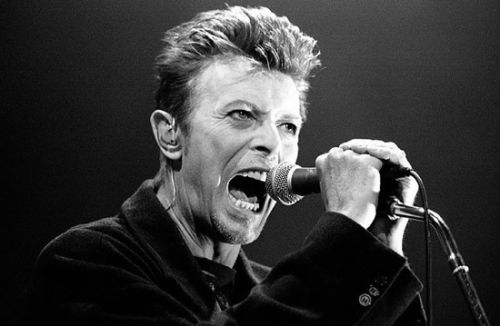JUDY WOODRUFF: One of the most influential and revolutionary musical artists of his generation, David Bowie, died yesterday after an 18-month battle with cancer.
In a career that spanned more than five decades, the sale of more than 140 million albums, and included an ever-changing and sometimes androgynous look that led to glam rock and many other iconic moments, David Bowie remained an original to the end.
Jeffrey Brown has our remembrance.
JEFFREY BROWN: Constantly changing, but somehow always uniquely himself, David Bowie was one of the culture's heroic figures for decades, appearing in many guises, shapes and forms, leaving a mark on rock music and well beyond.
He was born David Jones in South London in 1947, and rose to fame first in 1969 as Major Tom in the hit song "Space Oddity," and then, memorably, in the early '70s as another otherworldly character, Ziggy Stardust.

"Rolling Stone" music critic Anthony DeCurtis:
ANTHONY DECURTIS, "Rolling Stone": Suddenly, here's David Bowie, kind of a much more complex, subversive figure than many of those artists were. And he really gave a lot of energy for what was going to drive music, well, until now, really, but certainly through the '70s.
When he came on the scene, it was like, this is the future.
NARRATOR: Nothing you have seen or heard about David Bowie will prepare you.
JEFFREY BROWN: In 1976, Bowie stepped into another artistic world, acting as the pale alien in the film "The Man Who Fell to Earth."
Then, in the '80s, he became a music video and fashion icon, cementing his mainstream pop star status with a string of hits, telling his fans, let's dance. His range of pursuits, very much including a visual sensibility, also attracted those in the art world.
Michael Darling is with Chicago's Museum of Contemporary Art, which hosted an exhibition on Bowie.
MICHAEL DARLING, Chicago Museum of Contemporary Art: The thing that made Bowie such a good subject for a museum exhibition is the variety of his output. We had costumes. We had stage designs, graphic designs, handwritten lyrics, and things like that.
JEFFREY BROWN: The range, the showmanship, playfulness all were hugely influential. Madonna spoke to it when Bowie was inducted into the Rock and Roll Hall of Fame in 1996.
MADONNA, Musician: Before I saw David Bowie live, I was your normal, dysfunctional, rebellious teenager from the Midwest. And he has truly changed my life.
JEFFREY BROWN: Today, other musicians and artists spoke to Bowie's influence, including some of the day's biggest stars.
ANTHONY DECURTIS: It's one thing to be influential in rock 'n' roll, but when you start affecting the pop world — and by that, I mean people like Madonna or Lady Gaga — Bowie was an extremely important figure for them.
This idea that you could continually reinvent yourself, that every time you stepped out on the stage, it was a stage, and which character are you going to be playing? That was anybody's guess. Bowie never seemed old. That sense of reinvention really made him seem of the time at every time.
MICHAEL DARLING: So many artists these days are working across different media. They're making videos. They're doing performances. They're painting. They're taking photographs. And David Bowie was already, you know, as early as the 1960s, doing that kind of work.
JEFFREY BROWN: Tributes also came from fans, some at a mural in his hometown, even some from very high places, such as British Prime Minister David Cameron.
DAVID CAMERON, British Prime Minister: David Bowie was a genius. For someone of my age, he provided a lot of the soundtrack of our lives.
JEFFREY BROWN: Bowie was married for more than 20 years to the supermodel Iman, with whom he had a daughter. He also had a son from a previous marriage.
He had remained active in recent years, he'd kept working. The song "Lazarus" appears on his last album, a collaboration with a jazz quartet called "Blackstar," which was released this past Friday, on Bowie's birthday.
David Bowie died of cancer Sunday night. He was 69 years old.












